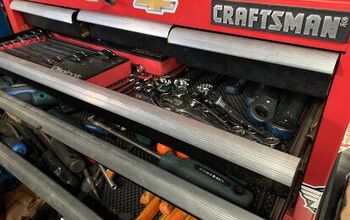Piston Slap: The Fallacy of Engine Hour Meters?

Ryan writes:
Sajeev Mehta
It appears that you have picked up where Steve Lang left off. That is answering general automotive questions that puzzle automotive enthusiast.
My question, what average speed would be good or bad for a used vehicle? I am in the market for a used truck (3-6yrs old), and have noticed that these newer trucks have mileage and hours tracked in the dash display screen. It is easy math to calculate the average speed for the life of the vehicle. What should I look for?
Or run from?
Best and brightest?
Sajeev answers:
I’ve been doing this Piston Slap thing for how many years now? (Hint: longer than Lang’s written Q&A columns.) Personal affronts to my fragile ego aside, you ask a good question.
With the advent of engine hour meters on modern gauge clusters, calculating average speed is easy.
But to make a purchase decision on that figure? No, considering the plethora of gearing choices and driving conditions that induce wear independent of your calculations. And the fact these meters can be reset … more on that later.
A higher average speed implies more highway driving, which is almost universally regarded as better than city miles. Vehicles with higher average speeds spend less time on the brakes, or accelerating from a standstill, or wearing engines out with cold oil, etc.
But here’s a problem: Average speed displays can be reset. Disconnect the battery for a few hours. Or re-flash the computer for a performance tune to wipe that number clean while adding value to would-be buyers looking for more performance and/or fuel economy.
I care not for this metric. When buying a used vehicle, stick to the basics: inside/outside condition, service history, fluid age/quality and the lifespan of typical wear items like tires/brakes. If the engine hour meter and odometer also agree with your assessment, then hey, even more reason to open your wallet.
[Image: Shutterstock user Forgem]
Send your queries to sajeev@thetruthaboutcars.com. Spare no details and ask for a speedy resolution if you’re in a hurry … but be realistic, and use your make/model specific forums instead of TTAC for more timely advice.

More by Sajeev Mehta
Latest Car Reviews
Read moreLatest Product Reviews
Read moreRecent Comments
- Formula m How many Hyundai and Kia’s do not have the original engine block it left the factory with 10yrs prior?
- 1995 SC I will say that year 29 has been a little spendy on my car (Motor Mounts, Injectors and a Supercharger Service since it had to come off for the injectors, ABS Pump and the tool to cycle the valves to bleed the system, Front Calipers, rear pinion seal, transmission service with a new pan that has a drain, a gaggle of capacitors to fix the ride control module and a replacement amplifier for the stereo. Still needs an exhaust manifold gasket. The front end got serviced in year 28. On the plus side blank cassettes are increasingly easy to find so I have a solid collection of 90 minute playlists.
- MaintenanceCosts My own experiences with, well, maintenance costs:Chevy Bolt, ownership from new to 4.5 years, ~$400*Toyota Highlander Hybrid, ownership from 3.5 to 8 years, ~$2400BMW 335i Convertible, ownership from 11.5 to 13 years, ~$1200Acura Legend, ownership from 20 to 29 years, ~$11,500***Includes a new 12V battery and a set of wiper blades. In fairness, bigger bills for coolant and tire replacement are coming in year 5.**Includes replacement of all rubber parts, rebuild of entire suspension and steering system, and conversion of car to OEM 16" wheel set, among other things
- Jeff Tesla should not be allowed to call its system Full Self-Driving. Very dangerous and misleading.
- Slavuta America, the evil totalitarian police state


































Comments
Join the conversation
I think the toughest thing on an engine is the time spent warming up. The colder the ambient temperature the tougher it probably is. Years ago, Consumer Reports wanted to compare different oils--some synthetic, some dino. The test vehicles were NY city taxis, under their regular use--which have a very low ratio of warm-up time to fully warmed time running. They tore the engines down at 60k. They found virtually no wear, and couldn't tell the difference between engines according to the type of oil used.
This is just an anecdote but worth considering. In the naval ship repair facility where I worked we were a 24/365 operation. The speed limit in the shipyard was 20 mph. The shipyard had lots of railroad tracks and crane tracks, so actual speed was even lower than that. The vehicle we had was probably started twenty to thirty times each dayshift, about half that often on backshift, trips were never more than 4 miles maximum and most often one mile or less. Under those circumstances the motor was most often not quite cold but also not quite up to normal operating temperature. I consider that to be quite severe service. Under those conditions a 1978 Dodge slant-six pickup lasted at least 100k miles. We did replace several starters though. IT note: All the cruft that runs on this site causes it to be slow in general and especially when one is trying to write a comment.